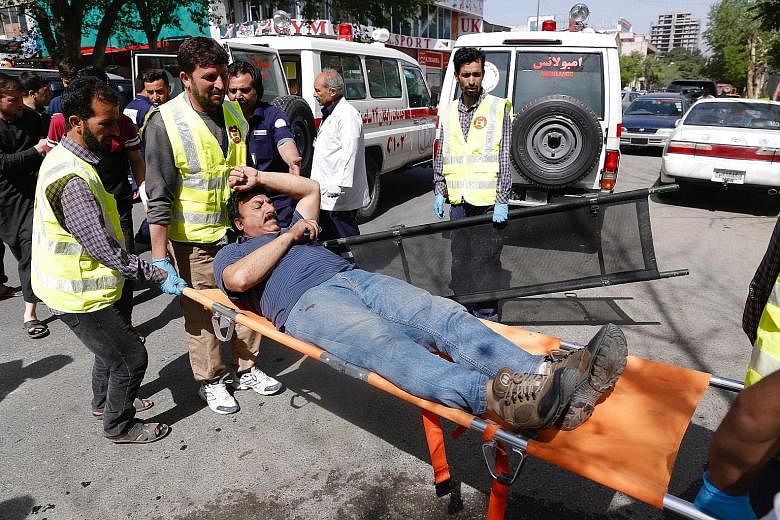KABUL • Twin blasts in the Afghan capital Kabul killed at least 26 people yesterday, including nine journalists who had arrived to report on the first explosion and who were apparently targeted by a suicide bomber, officials said.
The attacks, a week after 60 people were killed as they waited at a voter registration centre in the city, underlined mounting insecurity despite repeated government pledges to tighten defences.
Hours after the attack in Kabul, a suicide bomber in a vehicle attacked a foreign military convoy in the southern province of Kandahar, killing 11 children studying in a nearby religious school, police said.
"These attacks caused untold human suffering to Afghan families," said Mr Tadamichi Yamamoto, the top United Nations official in Afghanistan. "I am furthermore outraged by the attack which appears to have deliberately targeted journalists," he said in a statement.
The Islamic State in Iraq and Syria (ISIS) claimed responsibility for the two blasts in the capital, which killed at least 26 people, including four policemen, and wounded 49 seriously, Mr Hashmat Stanekzai, a senior police official, said.
The Afghan Journalists Safety Committee said nine journalists were killed in Kabul, the worst toll for media workers in a single attack in the country.
The journalists, who were all Afghan nationals, were killed in the second blast in Kabul as they waited by a security cordon, several hundred metres away from the site of the first one. The second came about half an hour after the first.
French news agency Agence France-Presse said its chief photographer in Afghanistan, Mr Shah Marai, was killed. Separately, British broadcaster BBC said that one of its reporters was killed in an attack in eastern Afghanistan's Khost province yesterday.
Mr Najib Danish, a spokesman for the Interior Ministry, said the suicide bomber appeared to have posed as a media worker and blew himself up where reporters and rescue workers had gathered.
"We know that a suicide bomber pretended to be a reporter. He showed his press card and stood among journalists before blowing himself up," Mr Danish said.
Afghanistan was already considered one of the most dangerous countries in the world for journalists, with at least 20 killed last year. Yesterday's attack was the most serious one on the media since 2016.
In the southern city of Kandahar, where Nato-led forces operate out of a big airbase, 11 children were killed and 16 wounded when a suicide bomber drove his explosive-laden van into a foreign-force convoy, police said.
The 11 children who were killed were studying in a nearby madrasah, or religious school, said Mr Matiullah Zhman, a spokesman for Kandahar police. In addition, eight members of the Nato-led Resolute Support coalition were wounded, the force said.
Hundreds of people have been killed and wounded in a series of high-profile attacks in Kabul since the beginning of the year, despite President Ashraf Ghani's offer in February for peace talks "without preconditions".
Taleban militants, fighting to restore their version of strict Islamic law to Afghanistan, announced their usual spring offensive last week and there has been heavy fighting in several areas of the country since.
ISIS first appeared in Afghanistan three years ago and its fighters have been active in the north of the country, but its main stronghold is in an area of the eastern province of Nangarhar, on the border with Pakistan.
REUTERS

